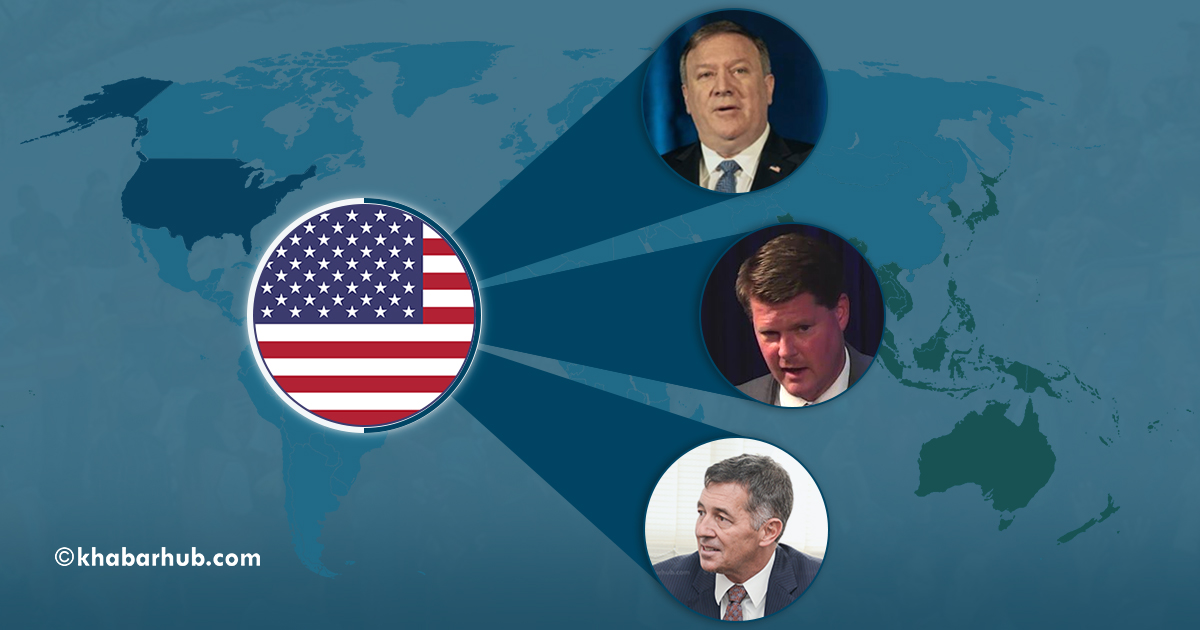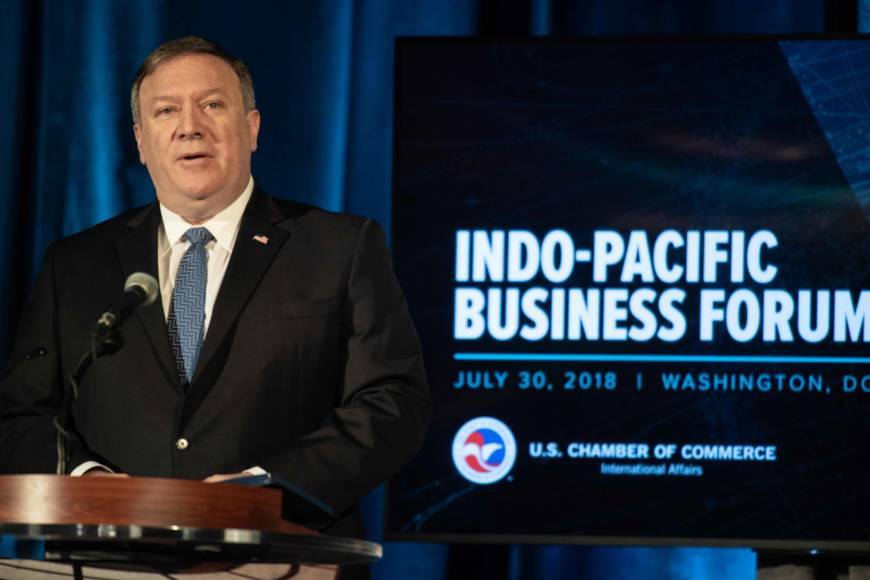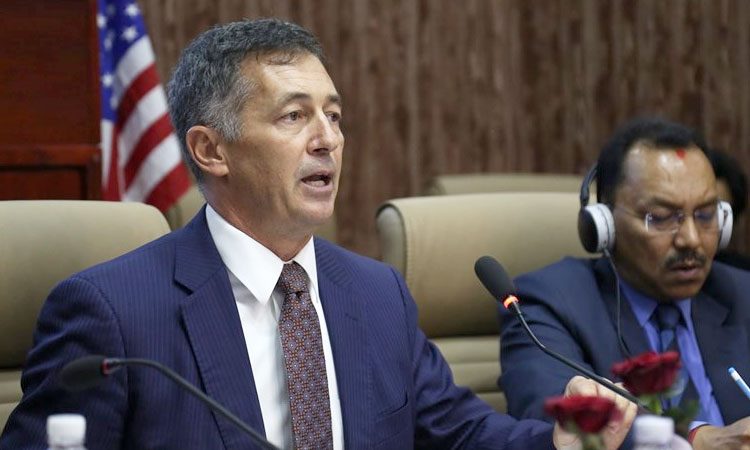0%

KATHMANDU: Indo-Pacific Strategy (IPS) and Millennium Challenge Corporations (MCC) have become the talk of the town in Nepal these days. When the date to ratify and implement the MCC grant comes closer, the protesting sounds seem to go higher.
Misinterpreting the Indo-Pacific Strategy’s conviction relating to the rule of law, openness, and freedom as an American attempt to counter China, various forums are kept busy depicting evil portraying the strategy.
Most of the discussions held in Nepal are based on the ill-interpretation of the documents rather than the facts.
At the time when the government of Nepal is planning to initiate the ratification of the MCC Compact so as to facilitate the implementation of the project, some people seem committed to misleading people by twisting the facts.
“When we say ‘open’ in the Indo-Pacific, it means we want all nations to enjoy open access to seas and airways. We want the peaceful resolution of territorial and maritime disputes. This is key for international peace and each country’s attainment of its own national aims.”
Discussion is the essence of democracy. The free, open and natural discussion leads to a logical and creative conclusion. This nurtures inter-party and intra-party democracy and makes the party dynamic.
However, the MCC Compact which was signed after consultations at various levels including the political and bureaucratic ones being questioned by the ruling party members is regarded as something strange.
It is remarkable that the concept was green signaled by the senior leaders of the ruling party including the incumbent PM and the Foreign Minister.
Thus, one of the mega grants offered to Nepal, as per Nepal’s appeal and priority, to enhance its infrastructure in energy and road sector is brought to debate with an attempt to ‘thwart’ it.
Formerly soft-toned leaders are tuning high in public displaying their double-speak in the issue and are saying MCC is not acceptable provided it is part of Indo-Pacific Strategy(IPS), a concept the USA has put forward for ‘combating terrorist threats, promoting stability across the Indo-Pacific region, increasing free and fair trade and strengthening energy linkages.’
Labeling the bid as anti-China, anti-North Korea and anti-Russia, those political leaders say Nepal, a stout supporter of non-aligned policy should not accept MCC Compact.
However, the US documents and the remarks of the senior officials do not match with such claims:
The gist of the Secretary of State, Mike Pompeo’s speech on Indo-Pacific Business Forum organized by American Chamber of Commerce on Jul.30, 2018 was, “When we say ‘free’ in the Indo-Pacific that means, we want all nations, every nation should be able to protect their sovereignty from the coercion by other countries. At the national level free means good governance, and the assurance that the citizens can enjoy the fundamental rights and liberties.”
“When we say ‘open’ in the Indo-Pacific, it means we want all nations to enjoy open access to seas and airways. We want the peaceful resolution of territorial and maritime disputes. This is key for international peace and each country’s attainment of its own national aims,” he had added.

“Economically, ‘open’ means fair and reciprocal trade, open investment environments, transparent agreements between nations and improved connectivity to drive regional ties, because these are the paths for the sustainable growths in the region,” he further said.
There were 3 US Ministers, 5 heads of departments and 20 ambassadors of 15 nations in the program. The program had shed light on the strategies the Trump administration had put forward. The participation of the program had talked about inclusiveness, however, in no way, there was anything anti-China.
Misinterpreting the report, disregarding the fact about the long cooperation between the US Military and Nepal military they spoke foul against the military support the US government provided Nepal Army.
They have tried to interpret IPS as a military strategy in the hide to function as America’s anti-China alliance in Nepal.
‘Indo Pacific Strategy’ is not the only document of the USA’s Department of Defense works on as a strategy, however, in Nepal the debate seems to be centered on it.
Citing that a 64-page long report published by the US Department of Defense on Jun.1 has included Nepal as a part of the Indo-Pacific Strategy, some sources have started talking about the ‘intent’. However, the report has not mentioned anything new in it. Almost all the things mentioned there had been publicly expressed by the Department.
The undue dispute raised in the issue is often based on the remarks on page 26 that have mentioned Nepal as the nation in Indo-Pacific. ‘Emerging Partnership’ with Nepal is made the issue of argument, however, the report has clarified its vision for a ‘ free and open Indo-Pacific’ which encompasses‘ values shared by the allies and partners in the region- one that emphasizes upholding a foundation of mutual respect, responsibility, transparency, and accountability.’
It has further said that the US will also ‘enhance our posture and presence while building the capabilities of like-minded countries, as we promote a networked and more integrated region, engage our burgeoning set of partners and invest for the future.’
The report had also mentioned the US Nepal military partnership. The defense partnership it has included as between Sri Lanka, Maldives, Bangladesh, and Nepal is in execution these days as well.
Misinterpreting the report, some even happened to talk about the collaboration of the Nepal Army and US Military as part of the strategy. Actually, this collaboration is going on since 1965.
Speaking at a program organized by ‘The Heritage Foundation’ on June 26, 2019, Randall Schriver, the Assistant Secretary of Defense for Indo-Pacific Security Affairs, had presented the gist of the report saying, “We are clear in the report that we are not asking the region to choose between China and the United States.”
He further stated that the strategy itself is inclusive. China is welcome to participate in the free and open Indo-Pacific in the values it entails.
“We recognize the interdependence of security and economics and that expanding prosperity is vital for all in the region, and the US does not want any country to have to choose and forego positive economic relations with any partners with China included,” he added.
Rather the question we are asking the region is ‘Can you choose respect for sovereignty and independence of all nations, large or small? Can you choose a peaceful resolution of disputes? Can you choose free-fair reciprocal trade and investment which includes the protection of intellectual property? Can you choose to support the international rules and norms including freedom in navigation? If you can choose those things all of which we believe are near-universal and enduring and inclusive principles and values…”
Similarly, addressing the queries related to MCC and IPS dispute, Randy Berry, the US Ambassador to Nepal had very aptly put forward the issues comprehensively. In his 45 minutes long speech delivered at the program organized by ‘Institute for Strategy and Socio-economic Research’ he had made it clear that wrong information and suspicion could spoil the chances of Nepal’s prosperity.
He had said, “We recognize that America is stronger when Nepal is stronger, America is healthier when Nepal is healthier, and America’s sovereignty is resolute and stronger when Nepal’s sovereignty is stronger and more resolute. That’s why our mission explains our key priorities.”

“These are the ties that bring together America’s goals with Nepal’s goals. This is the friendship and partnership that has defined our relationship now for more than 70 years and has benefitted both the US and Nepal. Indo-Pacific Strategy is the name we give to US policy,” he added.
According to him, the Indo-Pacific Strategy describes what the US strives to do. It tells what the Americans strive to do to protect and advance a free, open and secure Indo-Pacific region. Hinting at the attempt to misinterpret the vision of IPS had had further said, “Some like to claim that it is a secret military alliance or some kind of member-based organization somehow meant to trap this country within its conscience.”
Clarifying that Nepal had voluntarily initiated to get the support under MCC and IPS, he added, “The fact is as Foreign Minister Gyawali has told the parliament and repeated to the press and as I have repeatedly told Nepal has never been asked to join.”
A slight consideration of these excerpts and other documents put forward from the US and Nepali officials makes it clear that the MCC grant Nepal is awarded is not done as per US interest alone. It’s the need-based proposal for infrastructure development submitted by Nepal and granted by the US government.
To speak against the grant received as per the proposal submitted by the nation is not wise. To improve its declining diplomatic trustworthiness and help the country overcome poverty, without unnecessary skepticism, it’s high time for all patriots to decide to go for the mega project provided under MCC Nepal.
ALSO READ:
EDITORIAL: Endorse MCC immediately
Squabbling over MCC baseless: Diplomats, economists
MCC: Driving Nepal’s effort for sustained poverty reduction
It’s time to go for endorsement, effective implementation of MCC: Prof. Dr. Pyakuryal
MCC is a mega project with long-term positive impact in Nepal: Khadga Bdr. Bisht
MCCA urges govt, parties to endorse MCC agreement